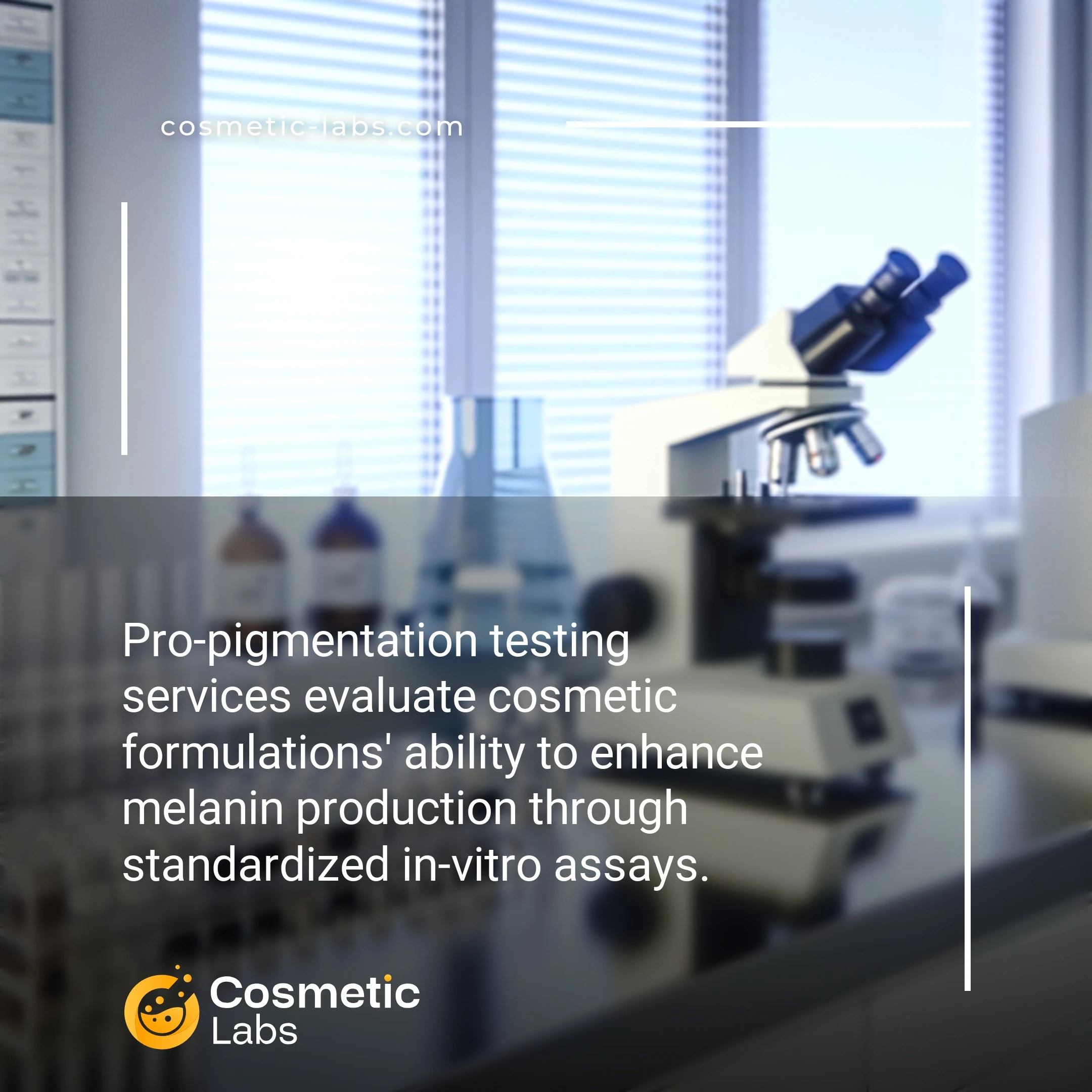Pro-Pigmentation Testing Services for Beauty Brands

What is Pro-pigmentation testing?
Pro-pigmentation testing services measure how effectively cosmetic ingredients and formulations enhance melanin production or skin darkening effects. Labs use in vitro melanogenesis assays and tyrosinase activity tests to quantify pigmentation-boosting properties in self-tanning products, bronzing formulas, and melanin-stimulating treatments. These preclinical evaluations help brands validate claims about tanning acceleration, color development timing, and pigmentation uniformity before market launch.
Why do you need this service?
Cosmetic labs on our platform use pro-pigmentation testing protocols to validate brightening serums, age spot treatments, and melanin-boosting formulations before market launch. These standardized assays measure tyrosinase activity and melanocyte response, delivering quantifiable efficacy data that supports regulatory submissions and marketing claims for hyperpigmentation products targeting melasma, sun damage, and uneven skin tone.
Who provides Pro-pigmentation testing services?
All cosmetic labs providing Pro-pigmentation testing services
There is no company providing these services at the moment.
Pro-Pigmentation Testing Services
Pro-pigmentation testing services evaluate ingredients and formulations that actively promote melanin production and skin darkening effects. These specialized assessments help brands develop tanning products, bronzing formulations, and pigmentation-enhancing cosmetics with measurable results.
Melanin Production Analysis
Labs measure how effectively your formulations stimulate melanocyte activity and melanin synthesis. Testing protocols include tyrosinase activity assays and melanin quantification studies using spectrophotometry methods. Most facilities run 14-day exposure tests on reconstructed skin models to track pigmentation changes over time.
Key testing parameters include:
- Melanin density measurements at 24, 48, and 72-hour intervals
- Tyrosinase enzyme activation levels
- Cellular viability during pigmentation enhancement
- Dose-response curves for active ingredients
Tanning Efficacy Validation
Professional testing validates your product’s ability to create natural-looking, even pigmentation without causing skin damage. Labs use standardized UV exposure protocols combined with your formulation to assess protective tanning effects. This data supports marketing claims about gradual, safe tanning enhancement.
Testing includes chromameter readings, visual grading scales, and photographic documentation of color development. Results typically show percentage increases in skin pigmentation compared to control groups, giving you concrete data for product positioning and regulatory submissions.
Ready to validate your pigmentation-enhancing formulations? Connect with specialized cosmetic labs on our platform to discuss your pro-pigmentation testing requirements and get detailed quotes for your project.
Practical Applications of Pro-pigmentation Testing Services
Cosmetic labs deliver targeted pro-pigmentation testing services that validate ingredient efficacy and formulation performance across diverse product categories.
Melanin-Enhancing Formulation Development
Labs evaluate tyrosinase activators and melanogenesis stimulators through controlled cell culture assays. Teams measure melanin production increases of 15-40% within 72-hour testing windows using B16 melanoma cell lines. These protocols assess copper peptides, alpha-MSH analogs, and botanical extracts like forskolin derivatives.
Testing includes dose-response curves to establish optimal concentration ranges. Labs also screen for cytotoxicity using MTT assays, ensuring safety margins above 80% cell viability at effective concentrations.
Tanning Accelerator Product Validation
Professional testing services validate bronzing lotions, tanning oils, and self-tanning formulations through standardized protocols. Labs use UV exposure chambers combined with spectrophotometric analysis to measure pigmentation enhancement. Results typically show 25-60% faster tanning response compared to control groups.
Testing protocols include photostability assessments and allergenicity screening. Labs evaluate formulation stability under simulated sun exposure conditions over 30-day periods, measuring active ingredient degradation rates.
| Testing Method | Measurement Parameter | Typical Timeline | Key Applications |
|---|---|---|---|
| Cell Culture Assays | Melanin production increase (%) | 3-7 days | Ingredient screening, formulation optimization |
| UV Chamber Testing | Pigmentation enhancement rate | 14-21 days | Tanning accelerators, sun care products |
| Spectrophotometry | Color density, L*a*b* values | 24-48 hours | Self-tanning products, bronzing formulas |
| Stability Testing | Active ingredient retention (%) | 30-90 days | Shelf-life validation, packaging selection |
Ready to validate your pro-pigmentation formulations? Connect with experienced cosmetic labs on our platform to access specialized testing protocols tailored to your product development needs.
